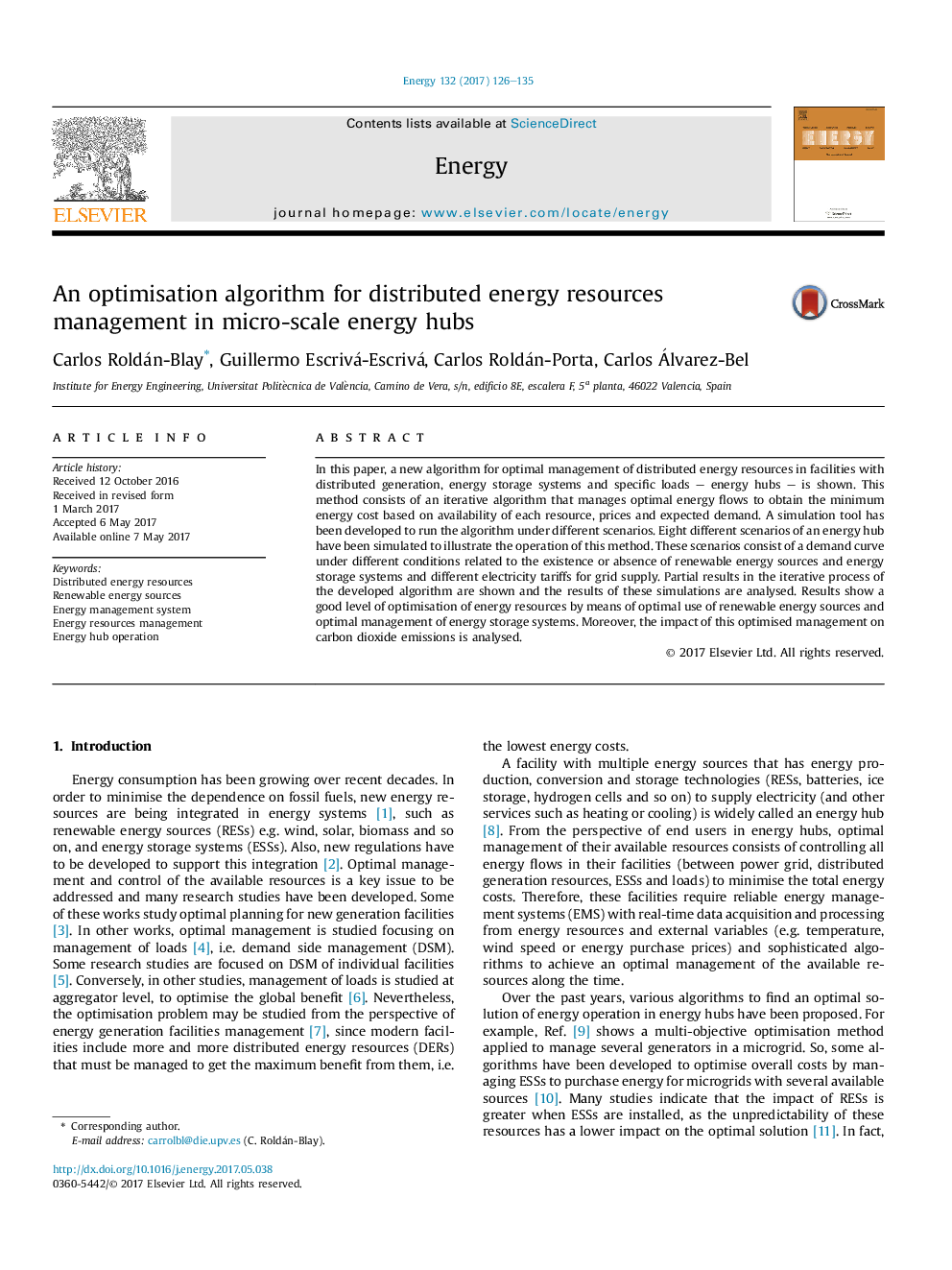| کد مقاله | کد نشریه | سال انتشار | مقاله انگلیسی | نسخه تمام متن |
|---|---|---|---|---|
| 5475683 | 1521419 | 2017 | 10 صفحه PDF | دانلود رایگان |
عنوان انگلیسی مقاله ISI
An optimisation algorithm for distributed energy resources management in micro-scale energy hubs
ترجمه فارسی عنوان
یک الگوریتم بهینه سازی برای مدیریت منابع انرژی توزیع شده در مراکز انرژی در مقیاس کوچک
دانلود مقاله + سفارش ترجمه
دانلود مقاله ISI انگلیسی
رایگان برای ایرانیان
کلمات کلیدی
منابع انرژی توزیع شده، منابع انرژی تجدیدپذیر، سیستم مدیریت انرژی، مدیریت منابع انرژی، عملیات توپی انرژی،
ترجمه چکیده
در این مقاله یک الگوریتم جدید برای مدیریت بهینه منابع انرژی توزیع شده در تسهیلات با تولید پراکنده، سیستم های ذخیره انرژی و بارهای خاص - مراکز انرژی نشان داده شده است. این روش شامل یک الگوریتم تکراری است که جریانهای انرژی مطلوب را مدیریت می کند تا حداقل هزینه انرژی را بر اساس دسترسی هر منبع، قیمت ها و تقاضای مورد انتظار به دست آورد. یک ابزار شبیه سازی شده برای اجرای الگوریتم تحت سناریوهای مختلف توسعه داده شده است. هشت سناریو متفاوت از یک مرکز انرژی شبیه سازی شده است که نشان دهنده عملکرد این روش است. این سناریوها شامل یک منحنی تقاضا تحت شرایط مختلف مربوط به وجود یا عدم وجود منابع انرژی تجدید پذیر و سیستم های ذخیره انرژی و تعرفه های مختلف برق برای عرضه شبکه می باشد. نتایج جزئی در روند تکرار الگوریتم توسعه یافته نشان داده شده است و نتایج این شبیه سازی ها مورد تجزیه و تحلیل قرار گرفته است. نتایج نشان می دهد سطح خوبی از بهینه سازی منابع انرژی با استفاده بهینه از منابع انرژی تجدید پذیر و مدیریت بهینه سیستم های ذخیره انرژی. علاوه بر این، تاثیر این مدیریت بهینه بر انتشار دی اکسید کربن مورد تجزیه و تحلیل قرار می گیرد.
موضوعات مرتبط
مهندسی و علوم پایه
مهندسی انرژی
انرژی (عمومی)
چکیده انگلیسی
In this paper, a new algorithm for optimal management of distributed energy resources in facilities with distributed generation, energy storage systems and specific loads - energy hubs - is shown. This method consists of an iterative algorithm that manages optimal energy flows to obtain the minimum energy cost based on availability of each resource, prices and expected demand. A simulation tool has been developed to run the algorithm under different scenarios. Eight different scenarios of an energy hub have been simulated to illustrate the operation of this method. These scenarios consist of a demand curve under different conditions related to the existence or absence of renewable energy sources and energy storage systems and different electricity tariffs for grid supply. Partial results in the iterative process of the developed algorithm are shown and the results of these simulations are analysed. Results show a good level of optimisation of energy resources by means of optimal use of renewable energy sources and optimal management of energy storage systems. Moreover, the impact of this optimised management on carbon dioxide emissions is analysed.
ناشر
Database: Elsevier - ScienceDirect (ساینس دایرکت)
Journal: Energy - Volume 132, 1 August 2017, Pages 126-135
Journal: Energy - Volume 132, 1 August 2017, Pages 126-135
نویسندگان
Carlos Roldán-Blay, Guillermo Escrivá-Escrivá, Carlos Roldán-Porta, Carlos Álvarez-Bel,
